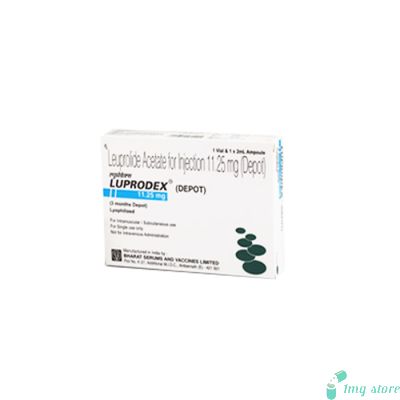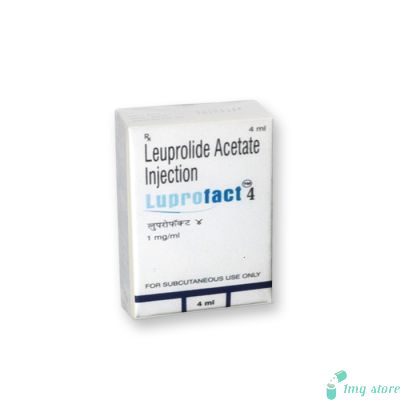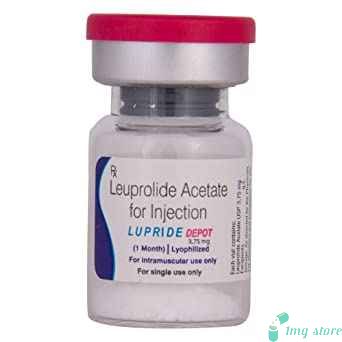Ulitas Tablet is a medication that contains ulipristal acetate as its active ingredient. Ulipristal acetate is a synthetic compound that belongs to a class of drugs known as selective progesterone receptor modulators (SPRMs). It is primarily used as an emergency contraceptive, commonly referred to as the "morning-after pill."
Ulitas Tablet is designed to be taken orally and is available in tablet form. It is most effective when taken as soon as possible after unprotected sexual intercourse or contraceptive failure, but it can still be used up to 120 hours (5 days) after intercourse. The tablet works by inhibiting or delaying ovulation, which prevents the release of an egg from the ovary, thereby reducing the chances of pregnancy.
It is important to note that Ulitas Tablet is not intended for use as a regular method of contraception and should not be relied upon as such. It is meant to be used as an emergency contraceptive option in situations where regular contraception has failed or was not used.
Before taking Ulitas Tablet, it is essential to consult with a healthcare professional who can provide guidance and ensure it is safe and appropriate for your specific circumstances. They will consider factors such as your medical history, any current medications or conditions, and potential interactions.
While Ulitas Tablet is generally well-tolerated, it may cause some side effects. Common side effects may include headache, nausea, abdominal pain, menstrual changes, dizziness, and fatigue. If you experience any severe or persistent side effects, it is important to seek medical attention.
In summary, Ulitas Tablet is an emergency contraceptive containing ulipristal acetate, a selective progesterone receptor modulator. It is taken orally and is most effective when used as soon as possible after unprotected intercourse or contraceptive failure. Remember, it is crucial to consult a healthcare professional for personalized advice and guidance regarding the use of Ulitas Tablet.
Ella, also known as ulipristal acetate, is a medication that offers several benefits in certain medical situations. Here are some of the benefits associated with Ella:
Emergency Contraception: Ella is primarily used as an emergency contraceptive or "morning-after pill." When taken within a specific timeframe after unprotected sexual intercourse or contraceptive failure, it can effectively prevent pregnancy by inhibiting or delaying ovulation. Ella is known to be highly effective, especially when taken as soon as possible after unprotected intercourse.
Extended Timeframe: One of the advantages of Ella compared to some other emergency contraceptive options is its extended timeframe for use. While some emergency contraceptives need to be taken within 72 hours, Ella can be used up to 120 hours (5 days) after intercourse. This longer window provides more flexibility for individuals who may have delayed seeking emergency contraception.
High Efficacy: Ella has shown to be highly effective in preventing pregnancy when used as directed. Studies have indicated that Ella has a higher efficacy compared to some other emergency contraceptive options. However, it is important to note that no contraceptive method is 100% effective, and the effectiveness of Ella decreases with time after intercourse.
Non-Invasive: Ella is a non-invasive form of emergency contraception as it is taken orally in tablet form. This makes it convenient and easy to use for individuals who may prefer this method over other forms, such as intrauterine devices (IUDs).
Prescription Medication: Ella is a prescription medication, and obtaining it requires consulting a healthcare professional. While this may be seen as a limitation to some, it ensures that individuals receive appropriate medical advice, personalized guidance, and necessary follow-up care.
It is important to note that Ella is not intended for use as a regular contraceptive method and should only be used in emergency situations. It is always recommended to consult with a healthcare professional to discuss your specific circumstances, receive proper guidance, and determine the most suitable contraceptive options for your needs.
While Ella (ulipristal acetate) is generally safe and effective, there are certain precautions to keep in mind when using this medication. Here are some important precautions to consider:
Allergic Reactions: If you have a known allergy or hypersensitivity to ulipristal acetate or any other ingredients in Ella, it is important to avoid using this medication. Allergic reactions can range from mild symptoms like rash and itching to severe reactions that require immediate medical attention.
Pre-existing Conditions: Inform your healthcare professional about any pre-existing medical conditions you have, such as liver disease, cardiovascular disorders, or uncontrolled high blood pressure. They will evaluate whether Ella is suitable for you or if an alternative method should be considered.
Medication Interactions: Ella may interact with certain medications, such as medications used to treat fungal infections (e.g., ketoconazole), HIV protease inhibitors (e.g., ritonavir), and certain medications used to control seizures (e.g., phenytoin). It is important to disclose all medications, including prescription, over-the-counter, and herbal supplements, to your healthcare professional before taking Ella to avoid potential interactions.
Pregnancy and Breastfeeding: Ella should not be used if you are already pregnant, as it is not intended for terminating an existing pregnancy. Additionally, it is unknown whether ulipristal acetate passes into breast milk, so it is recommended to avoid breastfeeding for one week after taking Ella.
Effectiveness of Regular Contraception: Ella should not be relied upon as a regular method of contraception. Its primary purpose is as an emergency contraceptive in situations where regular contraception has failed or was not used. It is essential to discuss and choose a suitable ongoing contraceptive method with your healthcare professional.
Side Effects: While uncommon, Ella may cause side effects in some individuals. Common side effects include headache, nausea, abdominal pain, menstrual changes, dizziness, and fatigue. If you experience severe or persistent side effects, it is important to seek medical attention.
Follow-up Care: It is recommended to follow up with your healthcare professional after taking Ella, especially if you experience a delayed or abnormal menstrual period, as this may indicate a potential pregnancy or other underlying concerns.
These precautions are not exhaustive, and it is important to consult with a healthcare professional before using Ella to ensure its safety and appropriateness for your specific circumstances. They can provide personalized advice, address any concerns you may have, and guide you in making informed decisions regarding emergency contraception.
Emergency Contraception: Ulipristal acetate is primarily used as an emergency contraceptive method. It can be taken within 120 hours (5 days) after unprotected intercourse to help prevent pregnancy. It works by inhibiting or delaying ovulation, reducing the chances of fertilization and pregnancy. It is important to take ulipristal acetate as soon as possible after unprotected intercourse to maximize its effectiveness.
Back-up Contraception: Ulipristal acetate can also be used as a back-up contraceptive method in situations where regular contraception methods fail or are missed. For example, if you forget to take your birth control pills or a condom breaks, taking ulipristal acetate can provide an extra layer of protection against unintended pregnancy.
Investigational Uses: Ulipristal acetate is being investigated for potential uses beyond emergency contraception. Some ongoing studies are exploring its effectiveness in the treatment of uterine fibroids, endometriosis, and other gynecological conditions. However, it is important to note that these uses are still being researched, and ulipristal acetate is not yet approved for these indications.
Here are some possible side effects associated with ulipristal acetate:
Headache: Headaches are a common side effect reported by individuals taking ulipristal acetate. They are usually mild and resolve on their own. If the headaches are severe or persistent, it is advisable to seek medical attention.
Nausea: Some individuals may experience nausea or feelings of queasiness after taking ulipristal acetate. Taking the medication with food can help alleviate this side effect. If nausea becomes severe or persistent, it is recommended to consult a healthcare professional.
Abdominal Pain: Abdominal discomfort or pain is another possible side effect of ulipristal acetate. This symptom is usually mild and temporary. However, if the pain is severe or persistent, it is advisable to seek medical attention.
Menstrual Changes: Ulipristal acetate can cause changes in menstrual patterns. This may include changes in the timing of your period, lighter or heavier bleeding, or spotting between periods. These changes are generally temporary and should resolve within a few menstrual cycles.
Dizziness: Some individuals may experience dizziness while taking ulipristal acetate. It is recommended to avoid activities that require mental alertness or physical coordination if you experience dizziness. If the dizziness is severe or persistent, it is advisable to consult with a healthcare professional.
Fatigue: Feeling tired or fatigued is a potential side effect of ulipristal acetate. It is important to get adequate rest and avoid activities that require high levels of energy if you experience fatigue. If the fatigue is severe or persists, it is recommended to seek medical advice.
: What is ulipristal acetate?
A: Ulipristal acetate is a synthetic compound and the active ingredient in medications like Ella. It belongs to a class of drugs called selective progesterone receptor modulators (SPRMs) and is primarily used as an emergency contraceptive, commonly known as the "morning-after pill."
Q: How does ulipristal acetate work?
A: Ulipristal acetate works by inhibiting or delaying ovulation, which is the release of an egg from the ovary. By preventing ovulation, it reduces the chances of fertilization and pregnancy. It may also affect the lining of the uterus to make it less receptive to implantation.
Q: How effective is ulipristal acetate in preventing pregnancy?
A: When used as directed, ulipristal acetate is highly effective in preventing pregnancy. Studies have shown that it has a higher efficacy compared to some other emergency contraceptive options. However, it is important to note that no contraceptive method is 100% effective, and the effectiveness of ulipristal acetate decreases with time after unprotected intercourse.
Q: How soon after unprotected intercourse should I take ulipristal acetate?
A: Ulipristal acetate is most effective when taken as soon as possible after unprotected intercourse or contraceptive failure. It can be taken within 120 hours (5 days) after intercourse, but its efficacy decreases with time. Taking it earlier within this timeframe maximizes its effectiveness.
Q: Is ulipristal acetate safe to use?
A: Ulipristal acetate is generally considered safe when used as directed. However, like any medication, it may cause side effects in some individuals. Common side effects include headache, nausea, abdominal pain, menstrual changes, dizziness, and fatigue. Severe or persistent side effects should be reported to a healthcare professional.
Q: Can I use ulipristal acetate as a regular method of contraception?
A: No, ulipristal acetate should not be used as a regular method of contraception. It is designed for use in emergency situations when regular contraception has failed or was not used. It is important to discuss and choose a suitable ongoing contraceptive method with a healthcare professional.
Q: Do I need a prescription to obtain ulipristal acetate?
A: Yes, ulipristal acetate is a prescription medication. You will need to consult with a healthcare professional who can provide the necessary prescription and offer personalized guidance based on your specific circumstances.
Q: Can ulipristal acetate interact with other medications?
A: Yes, ulipristal acetate can interact with certain medications, such as those that induce or inhibit liver enzymes. It is important to inform your healthcare professional about all medications you are taking, including prescription, over-the-counter, and herbal supplements, to ensure the safe use of ulipristal acetate.
Here are some notable drug interactions to consider:
Medications that Induce Liver Enzymes: Drugs that are known to induce liver enzymes, such as rifampin and certain antiepileptic medications (e.g., phenytoin, carbamazepine), may decrease the effectiveness of ulipristal acetate. These drugs can enhance the metabolism of ulipristal acetate, reducing its contraceptive efficacy. It is advisable to discuss alternative contraceptive methods with your healthcare professional if you are taking these medications.
Drugs that Inhibit Liver Enzymes: Medications that inhibit liver enzymes, like ketoconazole and HIV protease inhibitors (e.g., ritonavir), can potentially increase the blood levels of ulipristal acetate. This may lead to an increased risk of side effects associated with ulipristal acetate. It is important to inform your healthcare professional if you are taking these medications before using ulipristal acetate.
Herbal Supplements: Certain herbal supplements, such as St. John's wort, may also interact with ulipristal acetate. St. John's wort is known to induce liver enzymes and can decrease the effectiveness of ulipristal acetate. It is advisable to discuss the use of any herbal supplements with your healthcare professional to ensure the appropriate use of ulipristal acetate.
Contraceptive Methods: Ulipristal acetate is not recommended to be used together with other hormonal contraceptives, such as combined oral contraceptives or progestin-only contraceptives, as the combination may lead to hormonal imbalances and reduce the effectiveness of both medications. If you are using any other hormonal contraceptives, consult your healthcare professional for guidance on the appropriate use of ulipristal acetate.
| Manufacturer | : | Intas Pharmaceuticals Ltd |
| Equivalent Brand | : | Ella |
| Generic Search | : | Ulipristal acetate |











